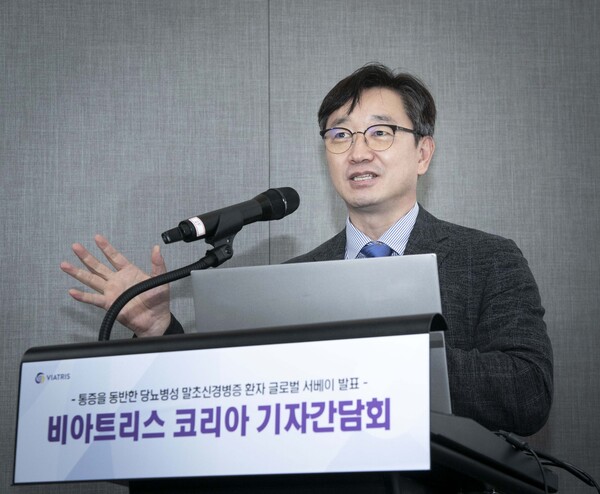Viatris Korea announced results from a survey involving 963 diabetic patients with neuropathic pain (NeP) from Korea, Italy, Spain, Malaysia and Mexico, during a press conference on Thursday.

The survey was designed to learn more about the impact of NeP and the unmet needs of people living with diabetes. NeP is persistent or recurrent pain caused by a disturbance of nerve function or nerve damage for periods longer than three months. One of the most common causes of NeP is diabetic peripheral neuropathy (DPN), which is the most prevalent chronic complication of diabetes.
In Korea, 33.5 percent of diabetic patients have DPN, of whom 43.1 percent have painful DPN (pDPN).
According to the survey, Korea has the greatest proportion of global respondents who claimed to be aware of the association between pain symptoms and diabetes before being diagnosed with DPN, with 86 percent (61 percent globally).
Despite such high awareness, when the initial symptoms of DPN actually occurred, many patients did not recognize the pain's association with diabetes, but rather attributed it to other pre-existing conditions (67 percent) or aging (45 percent), indicating a gap between knowledge and actual experience.
Additionally, the survey found that Korean patients with diabetes and NeP tend to take a longer period before DPN diagnosis compared to other countries.
On average, the majority of respondents globally contacted a physician within four months of the first signs and symptoms.
However, Koreans took six months before contacting a doctor after initial symptoms.
On average, the majority of respondents globally received their diagnosis within six months after the initial onset of symptoms, but it took Korean patients 12 months till their final diagnosis.
The percentage of patients who claimed to have received an incorrect diagnosis before being actually diagnosed with DPN was also higher in Korea than the global average (43 percent globally and 61 percent in Korea).
The survey also showed that pDPN affects patients' mood and ability to perform daily activities. About half of the global patients interviewed claimed that their quality of life is very much or completely affected by the condition. This percentage is higher in Korea as 73 percent said their quality of life has been very much or completely affected by the condition, and three in five respondents stated that they have had to take a long absence from work or adjust their work schedule.
However, despite its significant impact, Korean patients found it hard to express and explain their condition.
Only five in 100 Korean patients felt they could talk freely about their condition with anyone, which is the lowest among all countries (23 percent in Spain, 26 percent in Italy, 35 percent in Mexico, and 13 percent in Malaysia).
Korean patients cited fear of discrimination and being misunderstood about the condition as the top reason for not sharing the illness (both 37 percent), followed by fear of being disadvantaged at work (36 percent).
"DPN is a chronic and progressive condition that can cause chronic pain, foot ulcers, foot infections and, in severe forms, can even lead to amputation," Chief Kim Jong-hwa of the Department of Endocrinology at Bucheon Sejong Hospital said. "As such, timely diagnosis is imperative to reduce the risk of irreversible nerve damage.
This means that patients need better understanding to be able to clearly express and explain their symptoms and receive the appropriate treatment in time, he added.
Kim also stressed that early diagnosis and treatment can improve outcomes and quality of life and lower the financial burden for patients.
Viatris Korea Marketing Head Lim Hyun-jung also said, "Viatris Korea has been working on a variety of initiatives to prevent NeP from developing into a chronic condition, raise disease awareness and improve the treatment environment."
The company remains committed to raising awareness on the importance of early detection of pDPN and access to the correct treatment to help improve patients' quality of life, Lim added.

